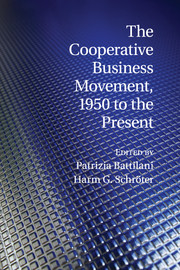Book contents
- The Cooperative Business Movement, 1950 to the Present
- Series page
- The Cooperative Business Movement, 1950 to the Present
- Copyright page
- Contents
- Contributors
- Acknowledgments
- Introduction: Principal Problems and General Development of Cooperative Enterprise
- Section 1 Cooperative Issues in a Global Overview
- Chapter 1 The International Cooperative Movement: A Quiet Giant
- Chapter 2 A World of Variations: Sectors and Forms1
- Chapter 3 Cooperative Movements in the Republic of Korea
- Chapter 4 “. . . What Is the End Purpose of It All?”: The Centrality of Values for Cooperative Success in the Marketplace
- Chapter 5 Why Cooperatives Fail: Case Studies from Europe, Japan, and the United States, 1950–2010
- Chapter 6 Demutualization and Its Problems
- Section 2 Selected Core Issues of Cooperative Enterprise in a Historical Perspective
- Appendix I Statement on the Cooperative Identity
- Appendix II Figures on the Cooperative Movement Worldwide
- Index
Chapter 6 - Demutualization and Its Problems
from Section 1 - Cooperative Issues in a Global Overview
Published online by Cambridge University Press: 05 September 2012
- The Cooperative Business Movement, 1950 to the Present
- Series page
- The Cooperative Business Movement, 1950 to the Present
- Copyright page
- Contents
- Contributors
- Acknowledgments
- Introduction: Principal Problems and General Development of Cooperative Enterprise
- Section 1 Cooperative Issues in a Global Overview
- Chapter 1 The International Cooperative Movement: A Quiet Giant
- Chapter 2 A World of Variations: Sectors and Forms1
- Chapter 3 Cooperative Movements in the Republic of Korea
- Chapter 4 “. . . What Is the End Purpose of It All?”: The Centrality of Values for Cooperative Success in the Marketplace
- Chapter 5 Why Cooperatives Fail: Case Studies from Europe, Japan, and the United States, 1950–2010
- Chapter 6 Demutualization and Its Problems
- Section 2 Selected Core Issues of Cooperative Enterprise in a Historical Perspective
- Appendix I Statement on the Cooperative Identity
- Appendix II Figures on the Cooperative Movement Worldwide
- Index
Summary
- Type
- Chapter
- Information
- The Cooperative Business Movement, 1950 to the Present , pp. 150 - 172Publisher: Cambridge University PressPrint publication year: 2012

